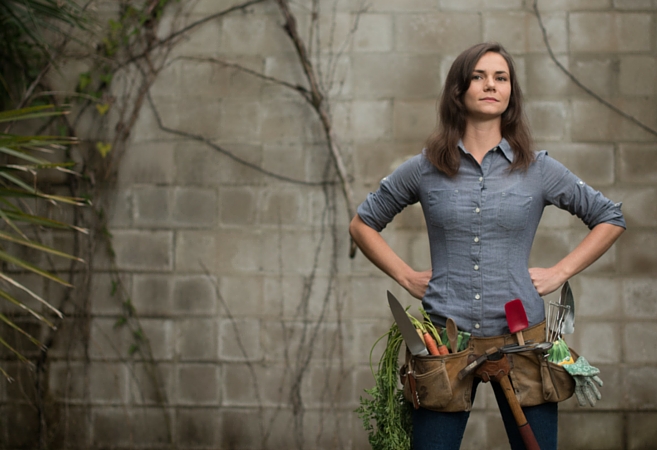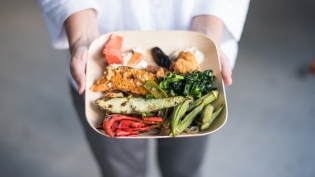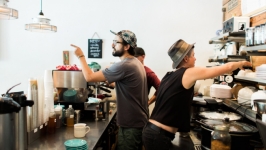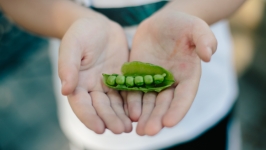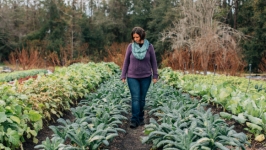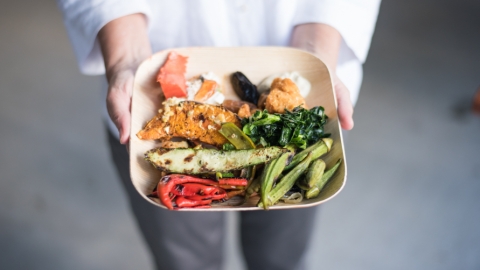Carmen Franz on Potato Chips and Food Access for All
Don't be fooled by the laid back stride and easy-going smile. Or, the flawlessly natural brunette locks and casual attire. When it comes to food policy, this woman means business. Carmen Franz is a woman on the go. She works throughout the state as the Fresh Access Bucks Manager for Florida Organic Growers and when she's at home in Jacksonville, she's a tenacious local food advocate. You might recognize her from the cover of our Women and Food issue, and there's a reason for that. While Carmen may be shy in social circles, she's nothing short of fierce when it comes to promoting sustainable food systems and access to healthy food for all in our region. Our prediction? She'll be a change-maker to watch in the decade to come.
How did you first become interested in food and food related issues?
I think professionally it began with a Food Politics course at UF that totally turned my world around. After learning about agriculture politics and the farm bill in the US, I began to question if the methods of production promoted by certain government policies really created the healthy and fair food system our planet desperately needs. It compelled me to take organic production classes, learn about agroecology and climate smart agriculture. My experience as a sustainable agriculture Peace Corps volunteer solidified my interest in food related issues and community advocacy. While growing up, I remember our mom saying to not to take advantage of what someone else is praying for, especially food, and to speak up for people who don’t have a voice. That stuck with me. Being a local food advocate perfectly merges my passions for environmentalism and social justice. Plus I love to cook, eat and grow my own food. We grew up with vegetable gardens, home cooked meals and hearing stories about my grandparents farming in Spain. When I tell them I want to be a farmer someday, they laugh and remind me they left Spain so we didn’t have to be farmers. They certainly instilled in us a sincere appreciation for how hard and important the work is.
You were a founding member of UNF's Ogier Gardens. How did that come about, and are you still farming on a small scale?
A series of serendipitous encounters led to the expansion of the UNF organic garden. After the Peace Corps I moved to Jacksonville on a whim and met Jonathan Felts, the garden coordinator before me. I took over in 2011 and doubled the size from 6 to 16 raised beds in the middle of a parking lot. We expanded relationships with food related courses and professors, eventually having more students interested in gardening than we had space to provide. One morning a staff person from the school’s food service provider, Chartwells, inquired about purchasing produce from us. Not at liberty to do so, I brought the idea to folks above me in the University and suggested we expand at a different location. I explained the new location could grow food for the cafeteria and serve as an outdoor classroom for students to explore multiple disciplines. Backed by growing student interest, they agreed and gave us an acre sized property on the north side of campus. A fulltime coordinator position was created when the garden moved into the Department of Health Promotion as it embodied the University’s Healthy Osprey Initiative, a campus wide effort to improve health and wellness. It was an incredibly fun and exhilarating experience. Named after the parents of our generous donor, Bruce Ogier, we built the Fredrick and Ophelia Tate Ogier Gardens to feature row crops, a wide variety of fruit trees, raised Vegetable beds, and peaceful sitting areas for students to relax. My successor, Kevin Anderson, is doing an amazing job and has since added a greenhouse, a rainwater catchment system and shitake mushroom log production. My garden now is just a 3 by 9 foot raised bed. I get a lot of produce from local farmers and farmers markets. Inevitably, Ogier Gardens produce ends up in my fridge too.
Your work focuses a good deal on access to food through programs like SNAP. What do you see as our region's greatest challenge to food security and why?
In Northeast Florida, similarly across the state, we have many direct marketing farmers struggling to maintain economically viable businesses. They want to feed people while making a living wage and support their families with normal stuff like healthcare and retirement funds. We should be proud in Florida to be the second largest producer of fruits and vegetables and grateful for our yearlong growing season. Yet the Fresh From Florida logo is more recognizable outside of our state than to Floridians.
Meanwhile, we have high rates of poverty and food insecurity with a general lack of awareness by consumers for why and where to access Florida grown produce. Our greatest challenge is in how we’ll connect Floridians to the abundance of agricultural crops grown in our state, while addressing the core issue of poverty that impedes people’s access to healthy foods. Food insecurity is complex. Oftentimes unsafe streets, the lack reliable, efficient transportation and the fact that the minimum wage is not a livable wage impact people’s choices more than the availability of healthy foods. When healthy food is accessible and affordable, people do want to make the healthier choice for their families. We must work on breaking down the barriers and addressing race and class biases.
My current work involves encouraging SNAP recipients to redeem their benefits at farmers markets to purchase fresh, healthy foods directly from Florida farmers. At participating markets, we match what a SNAP cardholder spends with FREE Fresh Access Bucks - up to $20, every market day. Customers can use them right away or later on to buy Florida grown fruits and vegetables. For example, a SNAP shopper who spends $10 of their SNAP benefits at a participating market receives an additional $10 to purchase fresh, local produce. It’s a win win win for our state’s farmers, low income families and our local economies.
You also have a background in working with small farms - and the local food movement. Are there three things you think we need to be doing to promote more of both in our region? If so, what are they?
The local food movement is apparently booming in Florida, yet many exploitive practices are still in place for all who labor in food. I think we need to take a closer look at where the costs of cheap food are being externalized. We all like getting a good deal when shopping. But we must recognize that if we’re buying a dozen eggs for 99 cents at a grocery store, what could that possibly mean for the farmer struggling to get a fair price for their product or the inhumane treatment of hens and the impact on our environment? First and foremost, we need to be promoting fairness, for farmers, farmworkers, our environment, processors, distributors, cooks, servers, dishwashers and everyone in between.
Secondly, it’s critical we recognize the modern day slave conditions in Florida for farmworkers and work on changing that reality. Farmworkers are the backbone of our food system. While lovely to purchase locally grown products from our farmers, there are still major systems in place that keep farmworkers and the rural poor in situations of poverty, exploitation and powerlessness, even in Northeast Florida. We can fix this by supporting the efforts of the Farmworker Association of Florida that struggle for better living and working conditions and equity and justice for farmworker families and communities.
Lastly, we should be promoting growing practices that protect our water and soil, and reduce or eliminate farmworkers’exposure to cancer causing chemicals. Farmers are stewards of the environment and have an amazing opportunity to combat climate change by sequestering carbon and rebuild perishing ecosystems by supporting biodiversity. With ever encroaching development in Florida, it is critical we promote the preservation of sustainably managed agricultural lands, not only to protect our water and soil now, but to be able to preserve our food sovereignty for future generations.
We talk a lot about our food system -- an interrelated network of restaurants, farms, artisans, policy makers -- all working together to celebrate and strengthen our food resources and culture in the region. What are the greatest opportunities you see for our food system in the next 5 years?
There has been a lot of growth and new collaborations within our local food system over the past few years. Ultimately, through food we’re working together to build community and give people a sense of time and place. We want to make it easier for people, schools, institutions, grocery stores, and restaurants to draw upon the unique abundance that is in our state. In order to facilitate this growth and take it to the next level, I think there’s a major opportunity for the creation of farmer-led local food aggregation and distribution facilities for local products to be processed, packaged and sold under USDA standards. Through many different collaborative efforts, we’ve identified the lack of these facilities to be a major impediment to increasing the sale of locally made products.
Secondly, we need to build funding opportunities for farmers to get food safety certifications, make on-farm structural changes and hire staff to meet new regulations, enabling them to sell more to local schools, institutions and stores. Farmers are required to have certain systems and policies in place to prevent the spread of food borne diseases. These are oftentimes costly, requiring structural changes and additional staff.
In Northeast Florida, we are fortunate to have the Duval County Food Policy Council as a platform to develop collaborative work to improve our food system. There is a major opportunity for more folks to get involved and participate. While you may cringe at the thought of attending another meeting, I believe this space to be highly underutilized with great potential to impact real, positive change.
The annual, Florida Local Food Summit is a great opportunity to network and learn from other farmers and local food advocates from across the state. The Florida Food Policy council also provides an opportunity to participate in the state’s rapidly developing local food movement, by supporting efforts to develop more sustainable and just food systems. They are currently recruiting new members.
What's your guilty pleasure when it comes to food? The one or two things you love to eat or drink, but rarely admit?
Definitely potato chips. Or any deep fried potato for that matter. Cut thinner the better.
What's your favorite local restaurant?
Southern Roots Filling Station. Their food is delicious! I also appreciate their dedication to organic, ethically-traded ingredients and support for local businesses. They share my belief that healthy food should be accessible to everyone.
What's your favorite vegetable?
Potatoes.
For more information on the organizations referenced in this interview, please visit the following resources online.
Duval County Food Policy Council: www.duvalfoodpolicycouncil.org
Fresh Access Bucks: www.FreshAccessBucks.com
Florida Organic Growers: www.foginfo.org
Florida Local Food Summit: www.floridafoodsummit.com
Florida Food Policy Council: www.flfpc.org


